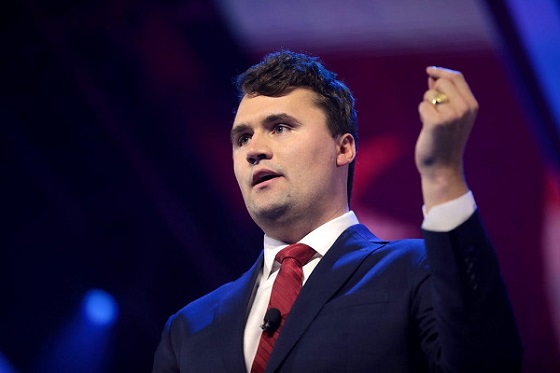Christopher Rufo
Charlie Kirk Did It All the Right Way

He exposed the lies at the heart of radical left-wing ideologies—and paid the ultimate price for telling the truth.
Like almost everyone in my circle, I have spent the better part of the last week in a stupor. The news of conservative activist Charlie Kirk’s assassination has left all of us who counted him as a friend or colleague in a state of shock and sadness.
I did not know Charlie Kirk well. But I had met him in various green rooms, appeared on his radio program, and worked with him to find capable staffers for the Department of Education. He was always genuine, idealistic, and dedicated to the cause. I’m still astonished by all that he accomplished in such a short period of time. He built an enormous organization, turned himself into a media star, advised the president of the United States, and built a beautiful family—all by age 31.
When we are in the fray of day-to-day politics, it is easy to get consumed by each new headline and triviality. But Kirk’s death marks a pivotal moment, requiring deeper reflection. His life, and tragically his death, reveal some profound truths about the man and about America.
First and foremost, Charlie Kirk did it all the right way. He was a conservative willing to wade into controversial territory. But he was always guided by the idea that debate is the great clarifier and that, in a democratic society, persuasion is the primary means of political change. He set up tables on campus. He debated his opponents. And he believed he could win through the ballot box.
Kirk’s death, and the subsequent reaction to it by the radical Left, underscored the arguments he had made during his time on the stage. For nearly ten years, Kirk had argued that transgender ideology, especially when paired with experimental medical procedures, would result in disaster. From the reports now emerging, it appears likely that the alleged assassin, Tyler Robinson, was radicalized online into anti-fascist and transgender politics. In their most extreme forms, both lines of thinking advocate a nihilistic embrace of violence—the antithesis of Kirk’s approach.
In fact, when he was murdered, Kirk was answering a question about the relationship between transgenderism and mass shootings, a phenomenon that seems to have accelerated in recent years. Kirk sought to engage his opponents in debate; his killer, quite possibly inspired by the trans-radical movement, sought to end that debate with a bullet.
The reaction to Kirk’s death by the mainstream Left has been equally troubling. Thousands of Americans, including students, professors, and even active-duty military members, have publicly cheered his assassination. Some have called for further violence against conservatives. Though I have covered left-wing radical movements for years, I was surprised by the number of people in the “helping professions,” including teachers and doctors, who embraced violent rhetoric.
How should conservatives respond? First, by drawing a line that Kirk himself exemplified: debate is healthy; violence is unacceptable. I’m glad to see that some institutions have terminated the employment of those who cheered on Kirk’s murder.
Contrary to the criticism that this represents a form of right-wing “cancel culture,” these firings were warranted. During the “woke” era, left-wing social media mobs sought the social annihilation of teenagers who sang rap lyrics and a Latino utility worker who cracked his knuckles the wrong way—examples of extreme and unjustified social policing. By contrast, a public school dismissing a teacher for applauding political assassination is a fair consequence.
All societies require boundaries. If there is no social sanction for celebrating violence, America will become a more dangerous place. Social trust, already fragile, will collapse.
On the question of transgender ideology, more information will emerge about Kirk’s alleged killer. But more than enough evidence already exists for federal law enforcement to consider radical transgender ideologues a threat to the civil order of the United States—much like white nationalists, neo-Nazis, militant “anti-fascists,” and other hateful groups. Some figures in the Trump administration, such as policy adviser Stephen Miller and Vice President J. D. Vance, have already indicated that they are ready to take action to enforce the law against violent movements.
Charlie Kirk sacrificed his life for truth. We should honor his legacy by standing firmly on principle, engaging in political debate, and, when necessary, enforcing the law against those who would organize violence in the name of politics.
Business
Cracker Barrel and the Power of Conservative Boycotts

The uproar over the restaurant chain’s rebrand might appear trivial, but it carries a deeper significance.
Last week, another viral culture war story captured the headlines. The old-timey restaurant chain Cracker Barrel had rebranded, removing the old man and the barrel from its logo, and replacing it with a simple, modernistic, typography-only design.
At first, I dismissed the story as trivial. I have never set foot in a Cracker Barrel and, as such, have little stake in what is emblazoned above its doorways. But after speaking with conservative activist Robby Starbuck, I learned there was something beyond the logo that deserved our attention. According to Starbuck, Cracker Barrel, whose customer base is heavily white, conservative, and rural, had spent the last few years adopting all the fashionable left-wing corporate policies: DEI, Pride, pronouns, race politics, and the rest.
The logo change might have caught the public’s initial attention, but the underlying political story had real stakes. If companies that depend on conservatives adopt radical left-wing policies, they must face the consequences.
And, thanks to the work of Starbuck and others, the social media uproar seems to have made a difference. As the story circulated through the media, the company’s stock price plummeted by as much as 17 percent. Cracker Barrel has quickly walked back its changes.
All this is salutary. Beginning with the revolt against Bud Light, the Right learned how to flex its muscles in the marketplace. Rather than defer to corporations as they did in the past, conservatives have realized that corporations have a culture and must be constantly reminded that, if they deviate from core American values, the consequences will be felt in their bottom line. Starbuck has had enormous success on this point, leading boycott campaigns that have changed policies at Harley-Davidson, Tractor Supply, John Deere, and other major brands.
A number of lessons can be drawn from this experience. First, conservatives can win these culture fights. Second, corporations follow the narrative in the media. Third, behavior changes through reward and punishment.
This last point is especially important. Some might dismiss the Cracker Barrel campaign as minor, or even embarrassing, given that the company is a decidedly down-class brand. But there is enormous value in making an example of the company and cementing a fear that conservatives can spontaneously lash out at any institution that crosses the line. Today, it’s Cracker Barrel; tomorrow it might be Pepsi, Target, or Procter & Gamble. As we have seen in recent years, corporate CEOs are highly sensitive to shifts in public opinion—and marginal changes in revenues—and will drop left-wing policies as soon as they become a liability.
The question is how to gain leverage. We are all tempted to be polite in public. But the fight over corporate culture can’t be won without securing real, tangible victories—which means real, tangible losses for institutions on the other side. Even if we don’t care about Cracker Barrel in particular, we should all care about the ideological capture of American institutions and use whatever power we have to reverse it.
And for that to occur, the Barrel must be broken.
Subscribe to Christopher F. Rufo.
For the full experience, upgrade your subscription.
Christopher Rufo
The “No Kings” Protest Is Pure Fantasy

 Christopher F. Rufo
Christopher F. Rufo
The underlying theory is that Donald Trump is an authoritarian leader on the cusp of becoming king.
I spent Father’s Day weekend in Hood River, Oregon, and stumbled upon the local “No Kings” anti-Trump protest. The crowd was populated mostly by Baby Boomers, who appeared to be living out a political fantasy, in which they could “stop fascism” by reenacting the protest movements of their youth. One sign, typical of the genre, derided Trump as a “felon, rapist, con man”; another riffed on Mary Poppins, reading “super callous, fragile, racist, sexist, Nazi POTUS.”
The underlying theory of this protest, which reportedly drew upward of 5 million demonstrators nationwide, is that Donald Trump is an authoritarian leader on the cusp of becoming king. The only way to stop him is to flood the streets and persuade the American people that Trump is a rotten character with despotic ambitions.
The theory, of course, is nonsense. Trump is a duly elected president. He is working with Congress on the budget. His deportation policy, which lent momentum to the weekend’s demonstrations, is predicated on enforcing existing law. Though President Trump contested the results of his first reelection campaign, he ultimately relented and peacefully transferred power to President Joe Biden—hardly the behavior of a tyrant.
Yet the protests are not without utility for the Left. They are not intended to grapple with the reality of the Trump presidency but to submerge reality in fantasy. The first step in entrenching the Left’s fictions in the public mind is to cultivate a sense of hysteria. In the president’s first term, crowds wore vagina-shaped hats and marched in the bitter cold. The tone of the “No Kings” protest was no less absurd, with women in Handmaid’s Tale costumes warning that Trump would reduce them to sex slaves.
The next step is to turn public energy into a threat. As seen in Los Angeles earlier this month, the Left’s more aggressive factions can operate alongside “mostly peaceful protests,” aiming to provoke law enforcement into overreacting. During Trump’s first term, leftist activists often played a double game—promoting “nonviolent” demonstrations for women’s rights or racial justice while allowing more confrontational elements to intimidate Trump supporters.
This time, immigration is the flash point. Trump has tied his presidency to mass deportations. The Left believes it can stop him by carefully shaping public opinion. That means highlighting emotional—if sometimes misleading—stories of deportation victims and sympathetic portrayals of protesters clashing with National Guard troops. These narratives are designed to paint Trump as an authoritarian and the Left as the resistance, with the aim of driving his approval ratings low enough to weaken his presidency.
The irony is that Trump does not have the power of a king—or, arguably, even the full power of the presidency, as established in Article II of the Constitution. District courts have blocked many of his policies down to the most minute detail, sometimes within hours of their adoption. A federal judge even prohibited the administration from removing gender-related content from government websites.
At the Hood River protest, I noticed a generational divide. The Baby Boomers were the most gullible, engaging in 1960s protest nostalgia and genuinely believing that America was under threat of incipient fascism. The younger generation, which came to political consciousness during the Trump era, seemed more skeptical. At the edge of the protest, I saw a group of teenage boys holding signs that read “Ban Onions” and “Ban Scratchy Blankets.” They seemed to see through the fiction of “No Kings,” viewing left-wing Baby Boomers, rather than Trump, as the rightful targets of satire and rebellion.
I hope that this attitude prevails. For 60 years, the Boomers have held a grip on the American political narrative; it has not been a story that conduced to national well-being. America elected Trump, in part, to demolish the remaining fantasies of the 1968 generation. Yes, no kings—and no more lies.
Invite your friends and earn rewards
-

 Frontier Centre for Public Policy1 day ago
Frontier Centre for Public Policy1 day agoBloodvein Blockade Puts Public Land Rights At Risk
-

 Alberta2 days ago
Alberta2 days agoParents group blasts Alberta government for weakening sexually explicit school book ban
-

 National1 day ago
National1 day agoChrystia Freeland resigns from Mark Carney’s cabinet, asked to become Ukraine envoy
-

 International1 day ago
International1 day agoFrance records more deaths than births for the first time in 80 years
-

 Business1 day ago
Business1 day agoThe Truth Is Buried Under Sechelt’s Unproven Graves
-

 Energy1 day ago
Energy1 day agoA Breathtaking About-Face From The IEA On Oil Investments
-

 COVID-1924 hours ago
COVID-1924 hours agoFreedom Convoy leader slams Canadian gov’t agency for praising its treatment of protesters
-

 Business1 day ago
Business1 day agoOttawa’s so-called ‘Clean Fuel Standards’ cause more harm than good







